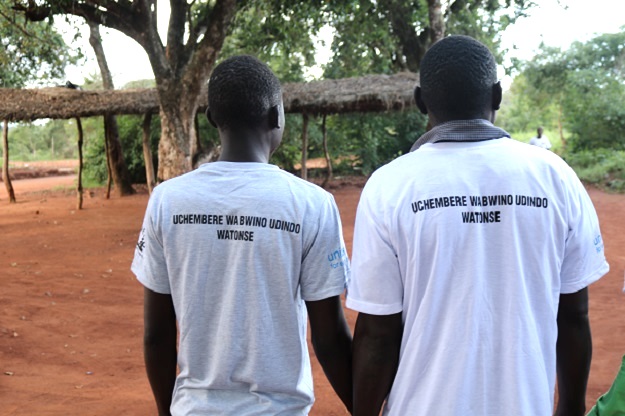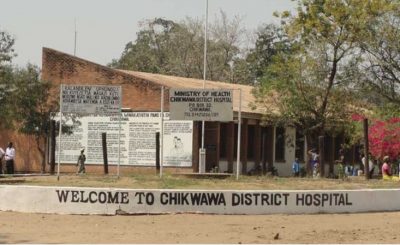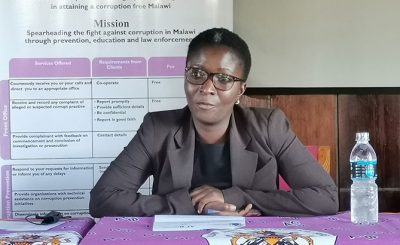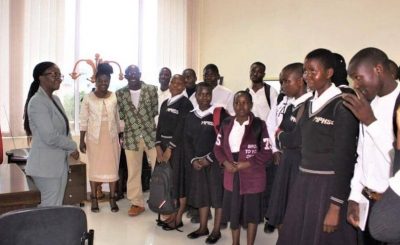Chidothi village is about 90 km from Liwonde Township in Machinga. There is poor road network and the popular trading centre, Ntaja is 50 kilometers away. Eighty five percent of Malawi’s population, including women of child-bearing age live in rural set-ups like Chidothi, mostly far from equipped health facilities.
It is late afternoon, a group of men and women have gathered under the mango tree outside a grass-thatched meeting room, probably seeking relief from the rain showers, and cracking some jokes.
A group of people has begun to get inside the meeting room. About seven men and three women from the village are meeting to discuss with the monitoring team on how they are engaging communities in fighting maternal and neonatal deaths in their area.
Ironically, it is not a conventional topic but it is a very important subject for their village. Since the inception of Every Woman Every Child (EWEC) Social Accountability project in 2016, villages across Traditional Authority Ngokwe in Machinga are taking maternal and neonatal issues seriously. Villages like Chidothi are championing for a change. It all started with drama groups that took the lead on the issue.
TFD Groups on the rise
Tichitepo kanthu Drama Group is one of the four groups in Machinga district that are taking maternal health matters into their own hands. They have been active for about a year.
With the help of the non-governmental organization, Youth Net and Counselling (YONECO), with support from UNICEF, villagers are encouraged to create an understanding of reproductive, maternal, newborn, child and adolescent health (RMNCAH) issues and lobby for support with training and advocacy.
“Culturally women never had a say in childbirth options. This was left to the men and village elders. They had no voice at all,” says Lloyd Makanjira, a Citizen Journalist for YONECO in Machinga.
YONECO is assisting TFD groups to be the eyes and ears of the area.
“The groups meet on a weekly basis to discuss issues pertaining to maternal health,” he says.
Local Chiefs are part of the solution
In a country where 20,000 traditional chiefs play a powerful role, it was crucial to include this powerful citizenry on the menu.
Tichitepo Kanthu Drama Group members appointed the influential Chief, Steve Sikochi, as the Chairperson for their grouping. Through drama performances and interface meetings, local chiefs are being trained in the importance of delivering at a health facility for rural women, while recognizing that their influence will largely determine what kinds of health care options are available to women.
The chief has been championing the maternal health cause and has brought with him scores of village chiefs who hold power in villages across T/A Ngokwe.
“Traditional chiefs are the gatekeepers in our society. They get respect and everyone listens to them. Their involvement in maternal health means people listen and follow their advice,” said Makanjira.
“If women fail to do this, we fine them,” Group Village Headman (GVH) Sikochi says.
GVH Sikochi has eight villages, including Chidothi, under his authority and traditional leaders like Sikochi play a powerful role in the community. In consultation with Radio Listening Clubs and Bwalos, the chief and his fellows has encouraged women to deliver at local health centres through Theatre for Development.
According to GVH Sikochi, efforts by TFD groups and local communities have resulted in the increase in deliveries at health facilities.
Men’s involvement
Like many districts in Malawi, Machinga is a highly patriarchal society and men make the decisions in their home. Previously, they would also decide the birthing option for their wives.
Club members say male involvement in maternal health issues should be encouraged. This allows men to talk about maternal and neonatal health options and to become part of the solution.
Treasure for Tichitepo kanthu drama group, Munyapa Gayesi, who doesn’t remember his age is a father of four and said it was important for him to join Tichitepo kanthu drama group.
Munyapa says the drama group has been good for the community.
“We do not want women to give birth at home and encourage them to go to a health centre,” he says
He says most importantly, they have encouraged other men to understand and ensure that maternal health is a community issue and not left in the hands of a few individuals only.
It is in small villages like Chidothi where change is happening and where community elders and villagers are taking the maternal health issue into their own hands.





